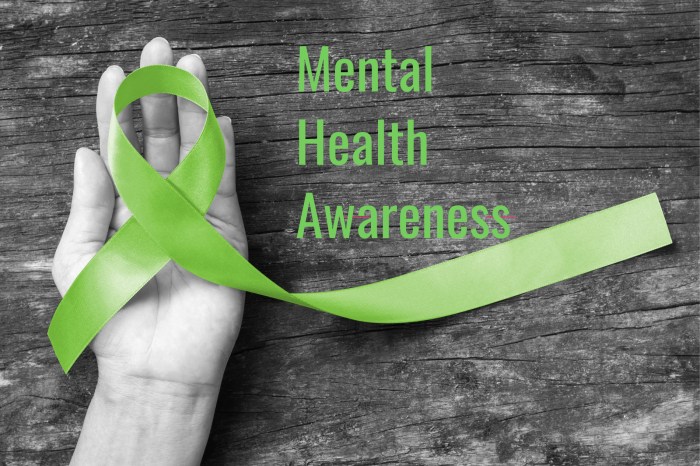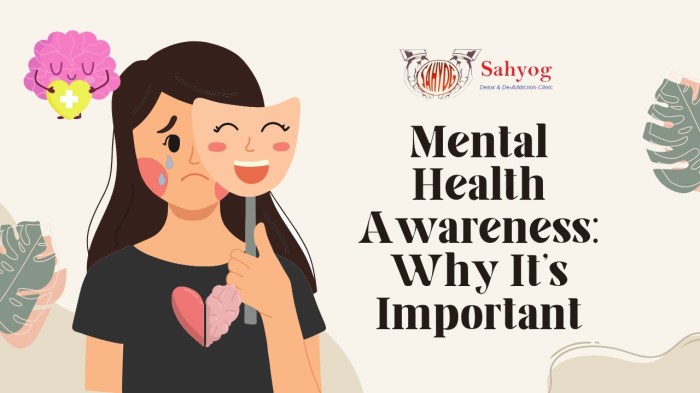Mental Health Awareness is not just a buzzword; it’s a critical movement shaping our society. From reducing stigma to providing essential resources, this topic delves into the heart of well-being with a fresh perspective that resonates with the youth.
As we navigate through the complexities of mental health awareness, let’s explore the various dimensions that impact our communities, workplaces, and beyond.
Importance of Mental Health Awareness

Mental health awareness is crucial for society as it helps individuals understand and recognize the importance of taking care of their mental well-being. By raising awareness about mental health issues, we can create a more supportive and understanding environment for those who may be struggling.
Positive Impact of Mental Health Awareness
- Increased access to resources and support services for those in need.
- Reduced stigma surrounding mental health, encouraging more open conversations and seeking help.
- Improved overall well-being and quality of life for individuals.
Reducing Stigma around Mental Health
Reducing stigma around mental health is significant as it allows individuals to feel more comfortable seeking help and support without fear of judgment. When stigma is reduced, more people are likely to prioritize their mental health and well-being, leading to healthier and happier lives.
Mental Health Awareness Campaigns
Successful mental health awareness campaigns play a crucial role in breaking the stigma surrounding mental health issues and encouraging individuals to seek help when needed. These campaigns often utilize various platforms to reach a wide audience and promote mental well-being.
Impact of Mental Health Awareness Campaigns
- Increased awareness and understanding of mental health issues in communities.
- Encouragement for individuals to seek help and support for their mental health concerns.
- Reduction in stigma associated with mental illness, leading to more open conversations and acceptance.
- Promotion of self-care practices and mental health resources available to those in need.
Effectiveness of Social Media in Spreading Awareness
- Social media platforms provide a vast reach and the ability to engage with a diverse audience.
- Hashtags, campaigns, and personal stories shared on social media can go viral, increasing visibility and impact.
- Real-time interaction and feedback allow for immediate engagement and support for individuals in crisis.
Innovative Approaches in Mental Health Awareness Campaigns
- Utilizing influencers and celebrities to share personal experiences and promote mental health resources.
- Interactive online campaigns that engage users in quizzes, challenges, or virtual events to raise awareness.
- Collaborations with mental health professionals and organizations to provide accurate information and support.
Resources for Mental Health Awareness

When it comes to mental health awareness, having access to the right resources is crucial. Whether you’re looking for information, support, or guidance, there are various avenues you can explore to learn more about mental health.
Key Resources for Individuals
- National Alliance on Mental Illness (NAMI): NAMI offers a wealth of resources, including educational programs, support groups, and helplines for individuals and families affected by mental health conditions.
- Substance Abuse and Mental Health Services Administration (SAMHSA): SAMHSA provides information on mental health disorders, treatment options, and resources for finding help.
- Crisis Text Line: A free, confidential text line available 24/7 for individuals in crisis or in need of immediate support.
Role of Educational Institutions
Educational institutions play a vital role in promoting mental health awareness among students and staff. By offering mental health resources on campus, organizing awareness campaigns, and providing counseling services, schools can create a supportive environment for those struggling with mental health issues.
Online Platforms and Tools
- Talkspace: An online therapy platform that connects users with licensed therapists for virtual counseling sessions.
- Headspace: A meditation app that offers guided mindfulness exercises to help reduce stress and anxiety.
- PsychCentral: An online resource for mental health information, support groups, and tools to assess mental health symptoms.
Mental Health Awareness in Different Communities
When it comes to mental health awareness, it is essential to recognize that different communities may have varying cultural backgrounds that influence their perception and understanding of mental health. This can present unique challenges when trying to promote mental health awareness and support in underserved communities.
Cultural Differences in Mental Health Awareness
In some cultures, mental health issues may be stigmatized or misunderstood, making it difficult for individuals to seek help or support. For example, in certain communities, there may be a belief that mental health struggles are a sign of weakness or a lack of faith. This can create barriers to accessing mental health resources and services.
Promoting Mental Health Awareness in Underserved Communities
To address the challenges of promoting mental health awareness in underserved communities, it is important to take a culturally sensitive approach. This may involve partnering with community leaders, religious organizations, and local healthcare providers to provide education and support tailored to the specific needs of the community. Additionally, offering resources in multiple languages and incorporating cultural traditions into mental health initiatives can help make these efforts more effective and inclusive.
Strategies for Inclusive Mental Health Awareness
- Organizing mental health workshops and events in community centers or places of worship to reach a wider audience.
- Providing mental health education in schools and workplaces to normalize conversations about mental health.
- Offering telehealth services and online resources to increase accessibility for individuals who may face barriers to seeking in-person support.
- Collaborating with local grassroots organizations and advocates to raise awareness and reduce stigma surrounding mental health in diverse communities.
Impact of Mental Health Awareness on Workplace
Creating a mentally healthy work environment through promoting mental health awareness can have numerous benefits for both employees and employers. By prioritizing mental health in the workplace, companies can improve productivity, reduce absenteeism, and enhance overall employee well-being.
Benefits of Promoting Mental Health Awareness in the Workplace
- Increased employee morale and job satisfaction
- Reduced stress and anxiety levels among employees
- Lower turnover rates and higher retention of talented employees
- Improved communication and teamwork
Examples of Companies with Successful Mental Health Awareness Programs
- Google: Offers on-site counseling services and mental health resources for employees
- Salesforce: Implements mental health training for managers and promotes open discussions about mental health
- Unilever: Provides access to mental health hotlines and support groups for employees
Role of Leadership in Fostering a Mentally Healthy Work Environment
- Setting a positive example by openly discussing mental health and destigmatizing seeking help
- Implementing policies that support work-life balance and mental well-being
- Providing resources and training for managers to support employees’ mental health
